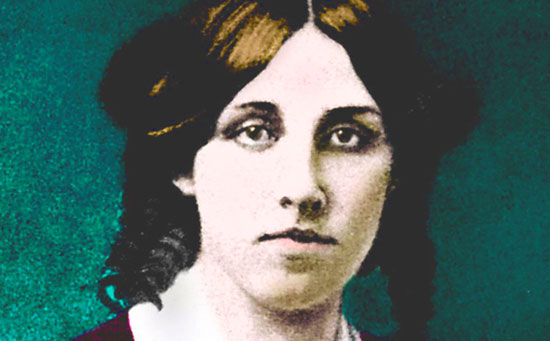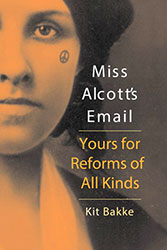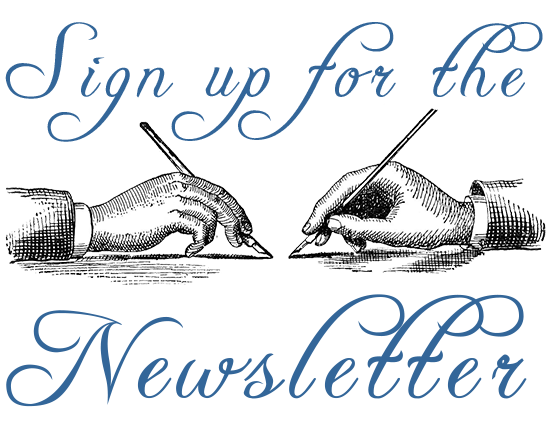Last Updated on April 13, 2020
Editor’s note: Kit Bakke has been in touch with Louisa May Alcott via an unusual method that Miss Alcott describes as jumping time zones. Ms. Bakke is in the 21st century and Miss Alcott is in the 19th century. Below is a recent note written by Miss Alcott in response to receiving from Ms. Bakke a bulky package of DVDs of several different period TV and film adaptations of Little Women.

To help keep this site running: Willow and Thatch may receive a commission when you click on any of the links on our site and make a purchase after doing so.

Forgive me for the very tardy delay, Ms. Bakke (and may I say again how much I applaud your century’s invention of “Ms.”) but since your large and oddly-shaped package arrived last month, I have neglected all duties. I am completely overcome by its contents—such strange boxes and buttons and knobs and blinking lights. Electricity, you say? And a whole new meaning for the word “battery.” What a wonder it all is.
And my goodness, pictures that move! These small silver plates with the hole in the middle clearly contain magic life. I am stunned and delighted and—best of all—entertained by this treasure trove of what you call movies or period drama adaptations of my Little Women story. Because, as Shakespeare said, the play’s the thing…but here in a much more cheerful context than Shakespeare intended, thank you very much.
Ever since my childhood I have loved the theatre. May the Pickwick Club endure forever! Books are wonderful in their own way, of course, but can’t match the sheer bouncing life of a stage play. I so much enjoyed seeing what those who have moved my Little Women to the stage have done—I say the stage, but these plays-on-silver-plates have somehow contrived to be far more than that—no stage could have room for all those trees and grassy fields and entire houses and roads, not to mention the snow and rain. How I envy the expansiveness and flexibility of the tools your playwrights and actors have on hand.
And “Christopher Columbus,” as Jo would say, so many sheets of paper you included—essays and criticisms and praises of those plays, and of the book itself, and heavens, more than one negative review of my own personal choices! I have learned to endure people’s criticisms of how I’ve lived my life, having received more than a few in my day. Even so, to have them heaped upon me from the future cannot, as you can imagine, be pleasant.
However, I must thank you most heartily for including the essay about Little Women published in the Harvard College newspaper, a triumph for any woman. Oh, how I envied my male friends who sauntered into Harvard’s hallowed classrooms, able to read and learn and discuss the world without having to think about washing dishes, kneading bread or mending handkerchiefs. I do hope women have improved their lives in your day. For myself, I am quite occupied these days in an effort to gain a woman’s right to vote.
This seems as good a place as any to voice my wish that your generation would pay as much attention to my books Moods and Work, as they seem to do to Little Women. Being known as a serious writer by adult women AND men was always my goal. I will forever regret that I was never taken seriously as an adult author after the Little Women bandwagon left the barn.
But we must focus on the questions you asked. I am nothing if not thorough with assignments, as I am sure you learned from our previous epistolary encounters. If I understand you correctly, you are particularly interested in what I think about all these plays—I suppose I should make an effort to say ‘period dramas’—that call themselves Little Women.
Whether it be on the page or the stage, I believe the best art must come from the heart of its creator, and—just as important—it must be received with an equally open heart. Although you sent me far too many versions for me to sensibly discuss, I must say I approached all of them with anticipatory pleasure. I quickly became interested in which scenes were enlarged and which were eliminated. Which characters had more dialogue or scenes and which had less? I scrutinized each actresses’ face and clothing—many appeared older than I intended, and far more beautiful than I pictured the March girls, and certainly more so than any of us Alcotts! (Except for all those freckles on several of the sisters in the version with someone named Maya Hawke playing Jo—perhaps freckles are considered more attractive in your day than in mine?)
I was so curious to see how future directors and actresses would balance themselves between my words and what I presume must be the quite different approaches needed to create smiles and tears in the audiences of your day. Times and people change—as you recall, Jo fought that reality long and as fiercely, but of course in the end, she embraced and defended her new life as vigorously as she had tried to stay in her old one.
There were certainly scenes where I said to myself, “My goodness, where did they get that idea?” and others where I thought they’d missed my point entirely. But I don’t begrudge any artist her creativity. I am in complete sympathy with the pleasures of adapting and embellishing written prose to fill a lively stage—goodness knows I did it often enough myself re-scripting a few of my favorite Dickens’ scenes. I loved playing Sairey Gamp and Mrs. Jarley, just for fun in the family, or to raise money for worthy causes. Clearly I share a happy camaraderie with the writers and actresses on your Little Women silver plate adaptations.
It was most interesting to see how the plays portrayed Professor Bhaer’s critique of Jo’s blood-and-thunder stories. Some had him tell her directly, some left it more subtle, but there was never any doubt that Jo understood and appreciated his meaning. Like all smart girls, she knew she had better in her.
I noticed that not every version showed Amy burning Jo’s novel in the kitchen stove, or included Amy’s fall into the ice. Too dastardly or frightening, I guess, for some. I wish that they all had as many scenes of Jo running pell-mell through the fields as the 1933 version did. My own youthful love of running was so strong, and its releasing benefits so great. I do appreciate the version with the freckles showing the March sisters working diligently at so many household tasks, and applause also for more than hinting at Marmee’s frustrations and occasional anger. It’s no use sugar-coating their lives; the fun they found in hard times is a big part of the story.
As to similarities, I had to laugh at how every version’s view of the Alcott household showed it perpetually littered with kittens.
Each version’s treatment of Mr. March was, I thought, somewhat awkward, reflecting, I am sure, my own true ambivalence. As I told reviewers who long ago noticed that there were no fathers in my fictional families, I just didn’t think I could write realistically about a family with an involved father because I had no personal experience of what such a family would be like. Your future actors and directors can make of that what they like.
I must beg your patience while I make a point in defense of myself which I wish you would pass on to your 21st century contemporaries: authors are NOT their books. Authors are people who write books for money; I defer to my character Jo who makes that perfectly clear.
I have to say this because some of the essays you sent imply that because my character Jo gets married, that means that the author, me, knuckled under and forsook my principles. Unfair! I cry Foul! I never abandoned my principles. My goal was to make money to free my mother from endless work and to provide for my sisters and our feckless but admirable father. Poverty, in case you’ve never experienced it, is a grinding, horrible thing, especially when paired with pity. I could never stand either one and did everything I could to ensure that we Alcotts could quit that life forever. Little Women, for all it chained me to a type of book that quickly grew stale for me, was also a godsend for which I am eternally grateful.
If your friends need another example of a woman author who made drastically different personal choices from her books’ characters, consider Jane Austen. Like me, Miss Austen chose to paddle her own canoe, yet all six of her novels concern young women whose stories end in happy marriages.
This puts me in mind of my last and unfinished piece of fiction, Diana and Persis. It is about two young women, one a painter and one a sculptor, making their way in Europe. I chose the location and their artistic pursuits because I think my youngest sister, May (Amy as she is called in Little Women) was the most successful of all of us in satisfactorily answering the four questions I posed in Diana and Persis. All women, I think, no matter what century they live in, must come to terms with them:
- Can a productive and creative single woman be happy?
- Can a married woman maintain her personal life and friends?
- Can women be both personally happy and professionally successful?
- Can people be happily married and still respect each other’s privacy and basic human rights?
These questions have dogged me ever since I could form a sentence on paper. I think your silver plated adaptations have served up many tasty morsels to continue that conversation. Cheers to us all, I say, because all we can do is keep trying. It’s back to Shakespeare: the play’s the thing.
Yrs Truly,
LM Alcott
 Kit Bakke is a Seattle-based author of three books, including Miss Alcott’s Email. She respectfully notes that she is not crazy enough to believe that she has actually had any direct conversations with or letters from Louisa May Alcott.
Kit Bakke is a Seattle-based author of three books, including Miss Alcott’s Email. She respectfully notes that she is not crazy enough to believe that she has actually had any direct conversations with or letters from Louisa May Alcott.
“Miss Alcott’s Email” is not only about Louisa May Alcott, the Civil War, the women’s suffrage movement and transcendentalism (all of which were part of Louisa’s life), but also reflects Kit’s rowdy politically active days in the antiwar movement of the 1960s and 70s. A former hospice nurse, Kit embraces the lessons learned through grief and courage.
Miss Alcott’s Email is AVAILABLE HERE
About the book “Miss Alcott’s E-mail: Yours for Reforms of All Kinds”: Shouldn’t life be more than simply showing up? Is it enough to be part of a family, make another family, earn your living, and then exit stage left? Or should you engage and be engaged in a bit of purposeful shaking and shoving along the way?
These are questions that Kit Bakke urgently needs answered. Tired of self-proclaimed gurus and self-help books, she turns to her childhood role model — Louisa May Alcott — for direction. She sends an e-mail to Louisa, and is amazed when she receives a reply. Their correspondence becomes a dance of ideas and tales bridging the mid-1800s and the twenty-first century.
But why Louisa? “Her abolitionist zeal, her women’s rights advocacy, her hospital work, her crazy commune days, her heartfelt desire to leave the world a better place, her humor and her energy all materialized in front of me,” writes Bakke. “Louisa was serious when she signed her letters, ‘Yours for reforms of all kinds.’ She made her life, she didn’t just live it.”
When Kit Bakke came of age in the late 1960s, America was going through major social and political turmoil. She and many of her generation elected to pursue radical ways to protest the Vietnam War and civil rights injustices at home, and Bakke joined the notorious Weather Underground. Eventually she left the movement to become a wife, a mother, and a professional nurse, but the persistent questions about the best way to live her life, make her contribution, and find satisfaction remained.
By initiating her extraordinary correspondence with Louisa May Alcott, Kit hopes to “pick up some clues for my friends and myself about how better to live the thirty or so years that might be remaining to us. And besides, we would be giving Louisa a treat that couldn’t be beat — a peek into the future.”
If you enjoyed this post, be sure to see The Period Films List,with the best British, historical and costume dramas sorted by era. Also see Little Women in Film and our review of the 2019 adaptation.



